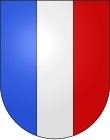Child trafficking
The "Gmeinijoggeliputsch" or Gelterkinderhandel was a curious incident from 1840 between Gelterkinden and the seven-year-old canton of Basel-Landschaft .
The dissatisfied
In September 1839, some men dissatisfied with the government gathered in Arlesheim under the name of the Committee of Friends of the Fatherland . They were: Johannes Martin, district clerk from Arlesheim, Heinrich Martin and his brother, Heinrich Völlmin von Sissach , the old district clerk from Waldenburg , Emil Jundt from Binningen and Dokter Kaus from Arlesheim. They wanted the constitution to be revised and demanded that the government announce the canton's financial situation.
After they had held several popular assemblies in Sissach and Birseck , where they tried in vain to get the people of Basel on their side, they were joined by one of the citizens of Gelterkinder: Jakob Freivogel, called "Gmeinijoggeli". He organized two popular assemblies in Gelterkinden on March 15 and April 5, 1840, which were attended by a respectable number of citizens.
Government response
The government in Liestal , which had cast a particularly critical eye on Gelterkinden since the “ Gelterkinder Sturm ”, found these meetings suspicious. They sent Jakob Freivogel a summons for a debate, but he did not appear. So they sent two troops to arrest him. However, some Gelterkinder citizens stood in front of the Gmeinijoggeli and prevented him from being captured.
His calls to these meetings, his refusal to hold himself accountable in Liestal, and finally the participation of some citizens and the prevention of his arrest by them, were declared by the government to be a riot in the whole community of Gelterkinden and measures of violence were ordered against them. Although on the morning of April 25th, Dr. Baader led the Gmeinijoggeli himself to Liestal, and despite all the assurances from the latter and the governor Schaub in Sissach that the community of Gelterkinden had not taken any unconstitutional or illegal steps and that everything was quiet, the government ordered around 800 men Artillery, cavalry, snipers, fusiliers, hunters and country hunters are supposed to occupy the community.
The cast of Gelterkinden
Towards the evening of the same day, despite the protest from the local council, they entered the village with cartridges and burning fuses and had to be billeted. While marching in, a young man, Jakob Buess, who in his drunkenness had allowed himself to contradict some officers, was wounded with sabers. The community had to pay a fine of 4000 francs and hand over the citizens who had prevented the community joggeli from being arrested. After two days of occupation, the troops were withdrawn again.
A few years later, when the mood had calmed down a bit and the matter was viewed from a distance, the cantonal government realized that their reaction at the time was exaggerated. They returned the 4000 francs to the community and considered this "deal" to be over.
Literary evidence
- Geography of Gelterkinden from 1864, page 76/77
- Gelterkinden Local History from 1966, page 20
- 430 years of Pümpin von Gelterkinden from 1986, page 116
